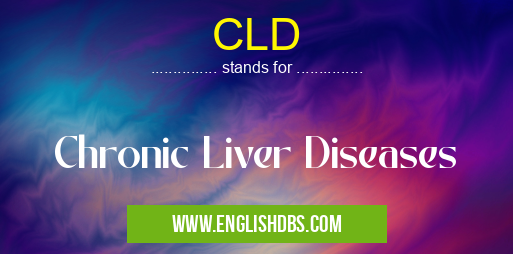What does CLD mean in DISEASES
CLD stands for Chronic Liver Diseases. CLD refers to a broad spectrum of conditions that affect the liver, causing ongoing damage and impaired function over an extended period. These conditions can result in various symptoms, complications, and potentially life-threatening consequences.

CLD meaning in Diseases in Medical
CLD mostly used in an acronym Diseases in Category Medical that means Chronic Liver Diseases
Shorthand: CLD,
Full Form: Chronic Liver Diseases
For more information of "Chronic Liver Diseases", see the section below.
What is CLD?
CLD encompasses a range of liver disorders that persist for more than six months. Unlike acute liver diseases, which are temporary and usually resolve within a short period, CLD progresses gradually, often leading to irreversible damage. Common types of CLD include:
- Chronic Hepatitis
- Cirrhosis
- Non-alcoholic Fatty Liver Disease (NAFLD)
- Alcoholic Liver Disease (ALD)
Causes
CLD can arise from various causes, including:
- Viral infections (e.g., hepatitis B, hepatitis C)
- Alcohol abuse
- Non-alcoholic fatty liver disease (obesity, diabetes)
- Autoimmune disorders
- Certain medications
- Genetic conditions
Symptoms
The symptoms of CLD can vary depending on the severity and underlying cause. Some common symptoms include:
- Fatigue
- Nausea and vomiting
- Abdominal pain and swelling
- Jaundice (yellowing of the skin or eyes)
- Dark urine and pale stools
- Loss of appetite
- Confusion or encephalopathy
Complications
If left untreated, CLD can lead to severe complications, including:
- Liver failure
- Portal hypertension (high blood pressure in the liver)
- Ascites (fluid accumulation in the abdomen)
- Variceal bleeding (rupture of enlarged veins in the esophagus or stomach)
- Hepatocellular carcinoma (liver cancer)
Diagnosis
Diagnosing CLD typically involves a combination of physical examination, blood tests, imaging studies (e.g., ultrasound, CT scan), and sometimes liver biopsy.
Treatment
The treatment of CLD depends on the underlying cause and the severity of the condition. Treatment may include:
- Medications to control inflammation or infection
- Lifestyle modifications (e.g., diet, exercise, alcohol cessation)
- Surgical interventions in severe cases
- Liver transplantation in end-stage liver failure
Essential Questions and Answers on Chronic Liver Diseases in "MEDICAL»DISEASES"
What are Chronic Liver Diseases (CLDs)?
Chronic liver diseases are characterized by ongoing damage to the liver over a period of months or years. They can lead to various complications, including liver failure and cirrhosis.
What are the common causes of CLDs?
Common causes include viral hepatitis (hepatitis B and C), alcohol abuse, non-alcoholic fatty liver disease (NAFLD), autoimmune disorders, and certain medications.
What are the symptoms of CLDs?
Symptoms may vary depending on the cause and severity of the disease. They can include fatigue, loss of appetite, nausea, abdominal pain, jaundice (yellowing of the skin and eyes), and swelling in the legs and ankles.
How are CLDs diagnosed?
Diagnosis typically involves a physical examination, blood tests (to check liver function and identify potential causes), and imaging tests (such as ultrasound or CT scans) to assess the extent of liver damage.
What are the treatment options for CLDs?
Treatment depends on the underlying cause and stage of the disease. It may involve antiviral medications for viral hepatitis, lifestyle changes (such as diet and exercise for NAFLD), or medications to reduce inflammation and protect the liver. In severe cases, a liver transplant may be necessary.
Can CLDs be prevented?
Some CLDs, such as viral hepatitis, can be prevented through vaccination. Others, like NAFLD, can be reduced by maintaining a healthy weight, eating a balanced diet, and limiting alcohol intake.
What are the long-term effects of CLDs?
Untreated CLDs can lead to serious complications, including liver cirrhosis (permanent scarring of the liver), liver failure, and increased risk of liver cancer.
Final Words: CLD represents a spectrum of chronic liver conditions that can significantly impact overall health and well-being. Understanding the causes, symptoms, and potential complications of CLD is crucial for early detection and timely management. If you experience any of the aforementioned symptoms, it is essential to seek medical attention promptly for proper evaluation and treatment. By addressing CLD proactively, it is possible to prevent or minimize the severity of complications, improve quality of life, and potentially prolong survival.
CLD also stands for: |
|
| All stands for CLD |
